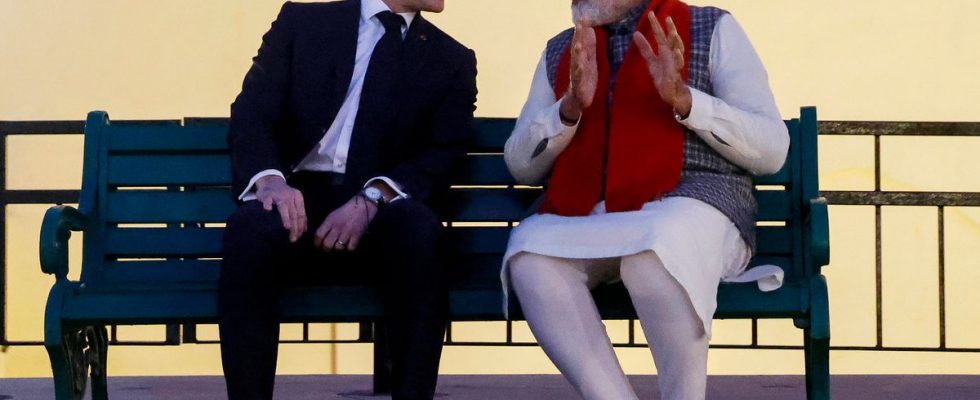Under the gaze of Emmanuel Macron, two French Rafales burst into the sky to open the military parade in New Delhi, on the occasion of the celebration of Indian Constitution Day. The French president was India’s guest of honor this Thursday, an opportunity to strengthen cooperation between the two countries, particularly in terms of trade. The Indian army, 60% equipped with Russian equipment, is seeking to diversify. And in this area the French are not left out. New Delhi has already purchased 36 French Rafales and negotiations are continuing for 26 additional aircraft.
“France has sold military aircraft to India since the 1950s, notably Ouragan [un modèle de Dassault] », Recalls Olivier Da Lage, associate researcher at the Institute of International and Strategic Relations (IRIS) and specialist on India. “These are historic undertakings but it would be a caricature to reduce everything to the military,” he tempers, however. An analysis shared by Olivier Guillard, associate researcher at the Institute for the Study of Applied Geopolitics. “There is a context: France is one of the leading arms sellers in the world and India has been one of the leading arms importers in the world for a dozen years. But we don’t just sell weapons to India! »
In the collective imagination, the Rafale retains a special place in our commercial relationship with India. “It’s symbolic of France and it flatters the pride of the Republic,” smiles Olivier Guillard, author of Geopolitics of India: new ambitions. The magnifying effect of Rafale sales announcements is, however, not entirely misleading. “France is not a major trading partner of India,” notes Catherine Bros, professor of economics at the University of Tours. ” It’s the 14th customer and 16th supplier in France », Recalls the India specialist. Quite weak places when put in relation to the giant that the Asian country has become.
A curled up giant
India won the position of the most populous country in the world from its Chinese neighbor in 2023 and is now 5th place among the world’s economies. “Franco-Indian relations are good, there are no political or historical differences and Narendra Modi and Emmanuel Macron get along well,” says Olivier Guillard. But New Delhi is keen to protect its economy. “India is very protectionist compared to China. She tends to open up but she remains very cautious and, since 2014, the opening rate has tended to decline,” explains Catherine Bros.
Between the “increase in customs duties” and the “administrative complexities”, “settling in India requires that you be present over the long term”, explains Olivier Da Lage. “ The recovery plan launched by India in 2020 was called “Autonomous India”, that’s quite clear,” illustrates Catherine Bros. Despite these difficulties and contrary to popular belief, France has nevertheless penetrated Gandhi’s country beyond military equipment. “France is present in India in several sectors: transport, mobility, energy transition and even pharmaceuticals,” notes Olivier Da Lage. Thus, in Nagpur, a city of more than two million inhabitants, Veolia holds the market for water management since 2007. Sanofi, a French pharmaceutical giant, employs some 5,000 people in the country.
The blue white red asset
” In India, 37 of the 40 CAC40 companies are present and around 1,000 French companies have partnerships in the country”, recalls Olivier Guillard, adding however: “the market share was below expectations”. “The margins for progress are strong,” adds Catherine Bros, referring to an extremely competitive environment, while more and more investors are eyeing the Indian market. Faced with the “hype”, the French will therefore have to work together to find a place.
With a historic understanding with India and recognized expertise in a host of areas, the French also benefit from good press in the country. “In India, articles have been very laudatory of France since Emmanuel Macron agreed to come. This excellent image that France enjoys in the collective imagination of Indians [bien au-delà des politiques] should also have positive consequences at the commercial level,” analyzes Olivier Da Lage. Before adding: “But this cannot be done in one day. » You will therefore have to be patient. Strengthening bilateral trade takes more time than a Paris-New Delhi Rafale.

